MEMBERS
PerosLab: Global change • Geoarcheology • Anthropocene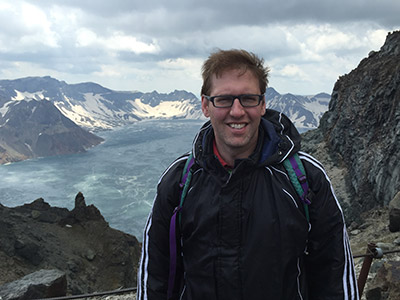
Dr. Matthew Peros
Director of Laboratory
I am a broadly trained physical geographer working at the interface between the climatological, ecological, and archaeological sciences. My research seeks to answer fundamental questions within two broad areas: (1) what have been the driving forces behind climate and landscape change during the Late Quaternary? and (2), how has the natural environment constrained/provided opportunities for cultural and biological change? To address questions in these areas, I use a field- and laboratory-based approach, integrating information derived from geological (e.g., sedimentological, geochemical) and paleoecological (e.g., palynological) investigations with archaeological and paleontological data. At present, my regional specializations include eastern Canada and the Caribbean, although I have also worked in high-latitude (northern) environments.
Postdoctoral experience: Laboratory for Paleoclimatology and Climatology, University of Ottawa
PhD: Physical Geography, University of Toronto
MSc: Physical Geography, York University
BSc: Archaeological Sciences and Geography, University of Toronto
Current members
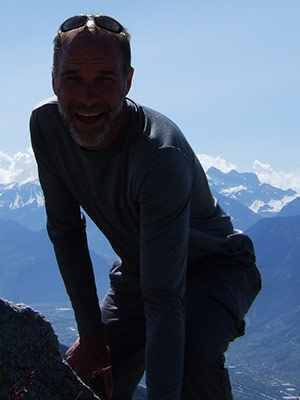
Martin Saint-Michel, P.Eng
MSc candidate, Physics and Astronomy Department, Bishop’s University (co-supervised with Dr. Lorne Nelson, Physics and Astronomy Department)
Cycles and patterns in climate are my main interests. My perspective on the study of climate comes from the principles of physics and I like to study how the laws of nature interact to create what we observe in the real world. I am particularly interested in nature’s capacity to generate rapid radical changes in the climate. The self-similar patterns produced by pollen and other proxies and their relation to biodiversity trigger my curiosity.
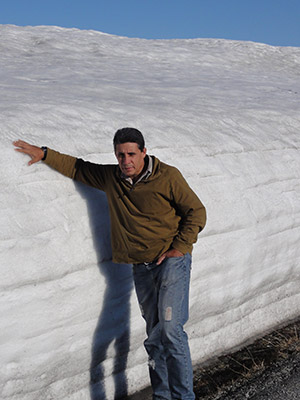
Felipe Matos Pupo
Auxiliary Professor, University of Ciego de Avila, and Research Scientist, CIEC, Cuba
My research goals regarding climate change are to: (1) seek answers regarding the drivers that trigger climatic changes, focusing on the contribution of both anthropogenic and natural phenomena; (2) assess the connection between biological and sociocultural variations and environmental changes in the corresponding historical context, particularly the paleo-aboriginal one; (3) study the relations between climate change and meteorological hazards.
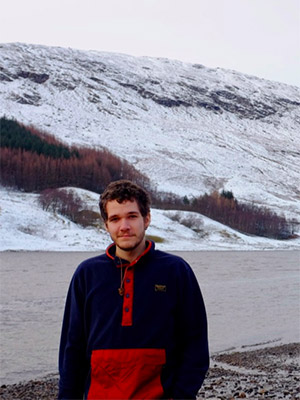
Antoine Lachance
MSc candidate, Geography, Planning and Environment, Concordia University (co-supervised with Dr. Jeannine-Marie St-Jacques)
My research interests involve extreme weather events, the role of deep-time perspectives on our understanding of climate change, and the integration of long-term climate reconstructions into today’s climate adaptation policies. For my master’s research, under the supervision of Dr. Peros and Dr. St-Jacques, I will be studying evidence of past hurricanes in sediment cores from the Magdalen Islands, a small archipelago in the Gulf of St-Lawrence. With the resulting paleo-storm record, I hope to gain a long-term perspective on the role of extreme weather events on the archipelago’s shoreline which currently experiences considerable erosion.
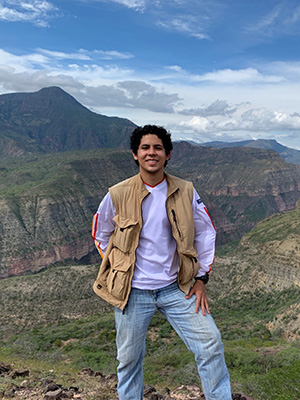
Cesar Arturo Vera Florez
MSc candidate, Département de géomatique appliquée, Université de Sherbrooke (co-supervised with Dr. Yannick Huot)
My main research interest is based on understanding how climate has changed in the Quaternary, in particular during the Pleistocene – Holocene transition, and how it has impacted and modified vegetation and landscapes, especially in tropical environments, using palynological based approaches such as the analysis of pollen and spores from sediment cores.
My master’s project, supervised by Dr. Matthew Peros and Dr. Yannick Huot (Université de Sherbrooke), consists of the palynological and charcoal analysis of a sediment core in order to understand how vegetation, forest fires, and human activities have changed in the last 9,000 years at a coastal site on Haiti.
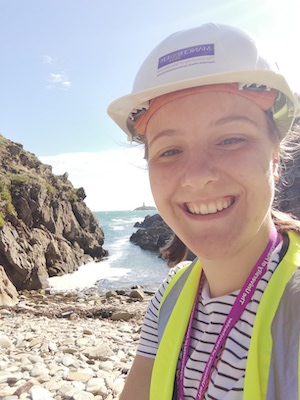
Alice Sparkes
Mitacs Globalink Fellow
I’m a second year Geology student at the University of Manchester specializing in geochemistry. I particularly enjoy using geochemical analyses to learn about the origin of material in sedimentary rocks and to reconstruct the processes and environments they were deposited in.
At Bishop’s University I will study hurricane and storm strikes through sediment cores to understand how climate change has affected them over the past few thousand years.
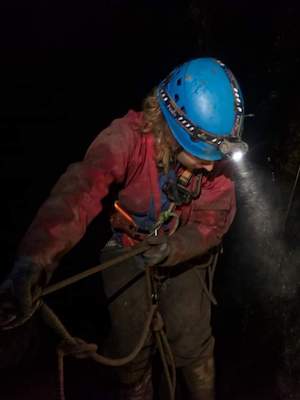
Joanna Iosifidi
B.Sc. candidate, Archaeology, University of Durham
Mitacs Globalink Fellow
I am an undergraduate student at the Department of Archaeology at Durham University, UK, going into the final year of my BSc Archaeology degree.
I am primarily interested in human/environment interactions of the past, as well as palaeoanthropology and human behavioural ecology and evolution. In my undergraduate dissertation, I will be studying the environmental impact of 19th century mining in the northeast of England, specifically looking at heavy metal pollution on plants close to mining sites.
Research Associates
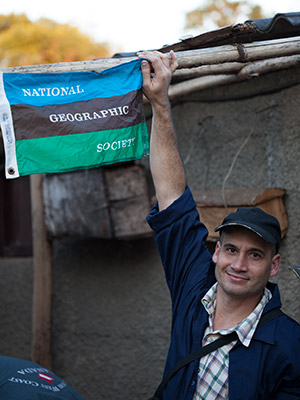
Joao Gabriel Martínez López
My main research interest concerns the taphonomic interpretation of deposits of fossil vertebrates and ancient humans. I use Taphonomy as a basic principle to study the natural and anthropic factors (mechanisms of taphonomic alteration) that influence the origin and formation of deposits, and the state of conservation of bone remains, and obtain data that can correlate certain paleoenvironmental factors that could be responsible for it.
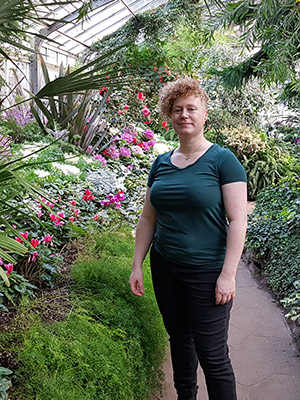
Anna Agosta G'meiner, MSc
My research interests focus on the impacts of Quaternary climate change, particularly on vegetation, sea level rise, and human activity. Using palynology, and other paleoecological indicators, I reconstruct past environments and examine environmental changes through long timescales. Currently, I support the lab in various projects, including developing a macro charcoal record of a site in northern Cuba.
Postdoctoral Fellows and Research Associates
Dr. Yassine Ait Brahim, 2021-2022 (Visiting Research Associate)
Yassine is now an Assistant Professor at UM6P – Mohammed VI Polytechnic University in Morocco. While at Bishop’s, Yassine worked on the geochemical analysis of a stalagmite from western Cuba dated to 80-100 ka to better understand high-latitude/tropical climate linkages, especially as they pertained to Heinrich events.
Dr. Leeli Amon-Veskimeister, winter 2017
Leeli’s research focuses on vegetation dynamics, in particular, the functional and phylogenetic diversity of sedimentary pollen and plant macrofossil data. This is done by evaluating the methods and associations with past climate and human impact. She received a PhD from Tallinn University of Technology and Tartu University, and an MSc from Tartu University. At Bishop’s, Leeli worked on understanding the late Glacial vegetation and climate history of southern Quebec through plant macrofossil analysis.
Dr. Shawn Collins, 2015
Shawn’s research focuses on karst topography and the sedimentary sequences recorded in anchialine caves and cenotes. Harsh limnological conditions promote conformable sedimentary records which can be utilized as a proxy for a number of geoscience and archaeological applications. His research focused on interpreting the ancient sedimentary record by studying the external forcing mechanisms which control sedimentation in these unique environments. He received a PhD and MSc degree from McMaster University. While a member of the PerosLab, Shawn worked on the geochemical analysis of a sediment core from Cenote Jennifer, Cuba, using XRF core-scanning data.
Completed Ph.D. and M.Sc. Students
Sydney Moser, M.Sc. (2022)
University of Ottawa (co-supervised by Dr. André Viau)
My master’s research focused on reconstructing Holocene climate dynamics in the Caribbean, especially as it related to understanding interactions between hurricane activity and droughts. I did this as part of a collaborative project with the Wood’s Hole Oceanographic Institution, and I analyzed a sediment core collected from offshore Haiti, using a multi-proxy approach of grain size analysis, XRF core-scanning, and other indicators.
Claire O’Neill Sanger, M.Sc. (2021)
Concordia University (co-supervised by Dr. Jeannine St-Jacques)
My master’s research focused on the analysis of a lake sediment core from Parc National du Mont-Orford, in the Eastern Townships of southern Quebec, Canada. I generated a 2300-year long record of vegetation change, fire, and human activity using pollen and charcoal data. My results showed a strong Little Ice Age signal, as well as evidence of the Medieval Climate Anomaly and Dark Ages Cold Period, in addition to human impact on the environment beginning at least as early as AD 1770.
Mercedes Liedtke, M.Sc. (2020)
University of Ottawa (co-supervised by Dr. André Viau)
My master’s research was focused on the investigation of climate impacts in the Caribbean during the late Pleistocene. Specifically, my M.Sc. thesis involved the analysis of a speleothem from western Cuba using stable isotopes of oxygen and carbon to reconstruct past hydroclimatic variability. The main findings of my thesis were that from the period from 100 – 68 ka, Caribbean climate was highly influenced by the D-O cycles and Heinrich events that occurred in the North Atlantic Ocean, suggesting strong high northern latitude-subtropical climate teleconnections.
Stéphanie Chune, M.Env., (2019)
Université de Sherbrooke
My master’s paper involved a comparative analysis of mangroves in South Asia (specifically the Sundarbans in Bangladesh and India and the Mekong Delta in Vietnam) for the purpose of formulating recommendations concerning their sustainable management and development.
Frank Oliva, PhD (2017)
University of Ottawa (co-supervised by Dr. André Viau)
My PhD research was on paleotempestology, the study of past tropical cyclones using geological proxy techniques, which is a growing discipline that utilizes data from a broad range of sources. I pushed the boundaries of paleotempestology in Nova Scotia by going beyond “established proxies”, such as grain-size analysis, loss-on-ignition, and micropaleontological indicators. During my PhD, I applied more advanced geochemical analyses, such as X-ray fluorescence (XRF) core scanning and stable isotopic geochemistry to generate new paleotempestological records from Atlantic Canada.
Anna Agosta G’meiner, MSc (2016)
McGill University (co-supervised by Dr. Gail Chmura)
My master’s research focused on investigating climate change impacts in the Caribbean region during the Holocene. A sediment core from a flooded sinkhole on Cayo Coco, Cuba was extracted and provided records of vegetation change, climate change, storm impacts, prehistoric human impacts on the environment, and sea level changes. Pollen analysis was the primary proxy developed to identify past changes in regional vegetation and to examine to what extent the Little Ice Age, the Medieval Warm Period, and human impacts recorded in other Caribbean locations are detectable in the pollen record.
Benjamin Marquis, MSc (2015)
Université de Sherbrooke (co-supervised by Dr. Mark Vellend)
The fundamental question that was the focus of my master’s research was: are species more sensitive to climate change at their distributional range limits than in the “center” of their ranges? To assess this question, I used dendroecological techniques (tree rings) to determine climate-growth relationships of sugar maple and birch trees along an altitudinal gradient at Mont Mégantic, southern Québec. As well, I tested whether tree growth increased in recent decades as a result of changes in climate. This research project will allow a quantitative test of the hypothesis that species at their distribution range limits are more sensitive to climate.
Honours Projects
Sophie McCafferty, 2021-2022
BA Environmental Science
Late Holocene pollen record from the Magdalen Islands, Québec, Canada
Jessica Lapenna, 2020-2021
BA Environmental Studies
Reconstructing Common Era Fire History in the Magdalen Islands.
Sabrina Mruczek, 2020-2021 (co-supervised with Dr. Jeannine St-Jacques, Concordia University)
BSc, Geography, Concordia University
Using Sediment Cores to Study Oxbow Lake Formation and River Dynamics in Southern Québec, Canada.
Charlotte Whyte, 2020-2021 (co-supervised with Dr. Jeannine St-Jacques, Concordia University)
BSc, Geography, Concordia University
Late-glacial fire history of the Scotstown Bog, southern Québec, using macrocharcoal.
Sydney Moser, 2017-2018
BSc Environmental Studies and Geography, Bishop’s University
Analysis of the Field of Paleotempestology: Exploring the Variability of Tropical Cyclones in the North Atlantic Basin.
Sydney Gilmour, 2017-2018
BSc, Bishop’s University
Investigating Influences of the Latitude Diversity Gradient on Taxa-Area Relationship for Modern Pollen Data (co-supervised with Dr. Jade Savage, Biology).
Mercedes Liedtke, 2016-2017
BSc, Bishop’s University
Oxygen and carbon isotopic analysis of foraminifera from Cenote Jennifer, Cayo Coco, Cuba.
Ashley Parker, 2015-2016
BA, Bishop’s University
Sediment laminations from a flooded sinkhole on Cayo Coco, Cuba: implications for paleoclimatology.
Jennifer Ward, 2014-2015
BA, Bishop’s University
Historic Human Impact at the Johnville Peat Bog Inferred from Pollen Data
Jamie Carroll, 2013-2014
BA, Bishop’s University
Late Holocene climate history of the Johnville Peat Bog using testate amoeba data
Benjamin Marquis, 2013-2014
BSc, Université de Sherbrooke
Tree-ring analysis of sugar maple on Mont Megantic, southern Quebec
Andrew Manouck, 2012-2013
BA, Bishop’s University
Tree-ring analysis of Picea mariana (black spruce) from the Johnville Peat Bog, Eastern Townships, Quebec
Research Assistants
Tanya O’Reilly, 2019-2021
B.Sc. Environmental Sciences
Kerstin Diederich, summer 2021
Mitacs Globalink Research Internship
Georg-August-Universität, Göttingen, Germany
Callum Bell, summer 2021
Mitacs Globalink Research Internship
University of Durham, UK
Tanisha Campbell, 2020-2021
Knowledge Mobilization Fellow
Aidan McGillis, winter 2019
B.Sc. Environmental Sciences, NSERC Undergraduate Student Research Award
Zachary Masson, summer 2018
BA, Concordia University
Fanny Lashcari, summer 2018
Intern from SupAgro, Montpellier, France
Geetanjali Deole, summer 2017
Mitacs Globalink Research Internship
Indian Institute of Technology (Indian School of Mines), India
Luís Guilherme Moreira da Silva, summer 2017
Mitacs Globalink Research Internship
Universidade Federal do Paraná, Brazil
Angela Lanza, 2014-2016 (Lab Technician)
BSc Environmental Sciences
Chelsey Paquette, 2015-2016
BSc candidate, Life Sciences Biology- Ecology and Biodiversity
Bishop’s University
Kaitlyn Sjonnesen, summer 2014
BSc Biology, NSERC Undergraduate Student Research Award
Bishop’s University
Charles Parent-Moreau, summer 2014
BA Environmental Studies and Geography
Bishop’s University
Leila Ponsford, summers 2012 & 2013
BSc Chemistry and BEd, NSERC Undergraduate Student Research Award
Bishop’s University
Hayley Roberts, 2012-2013
BSc Biology
Bishop’s University
Julien Vachon, summer 2013
BSc Environmental Science
Bishop’s University
Jamie Carroll, summer 2013
BA Environmental Studies and Geography
Bishop’s University
Kathleen Chan, summer 2012
BSc Biology & B.A. Environmental Studies
Bishop’s University
Amelie Genovese, fall 2012
BA Environmental Studies
Bishop’s University
